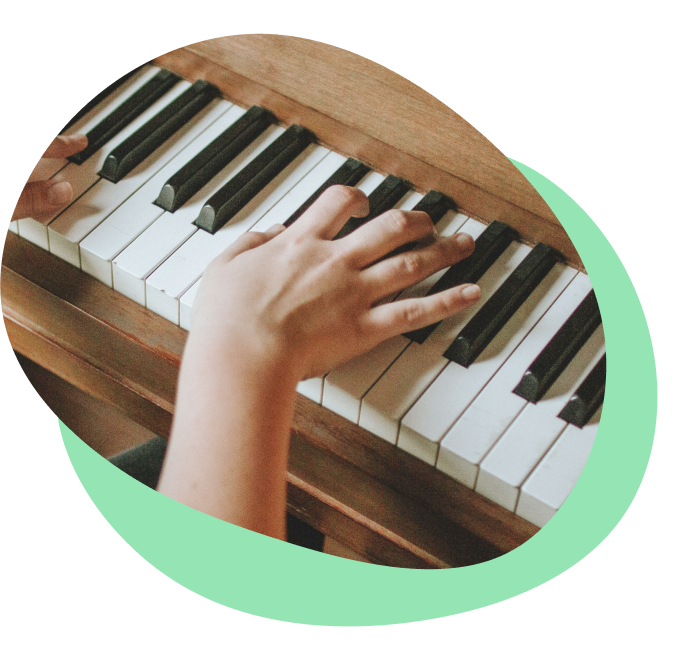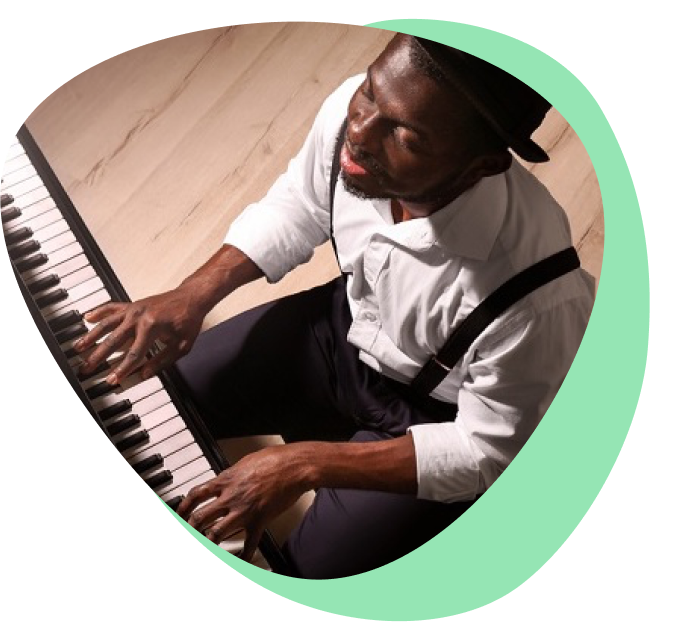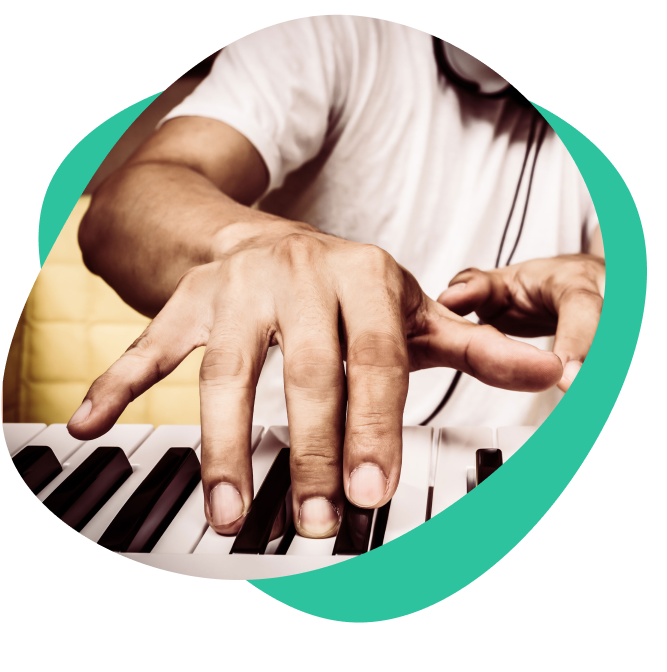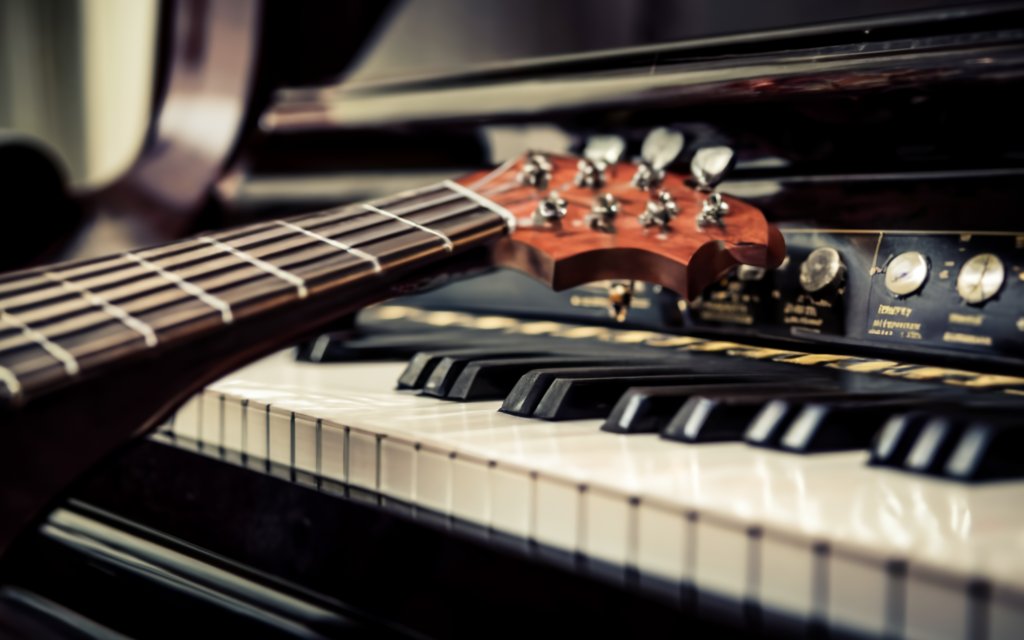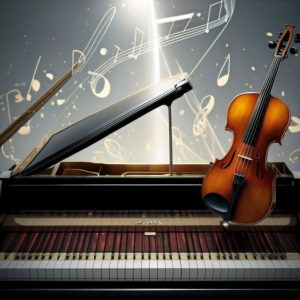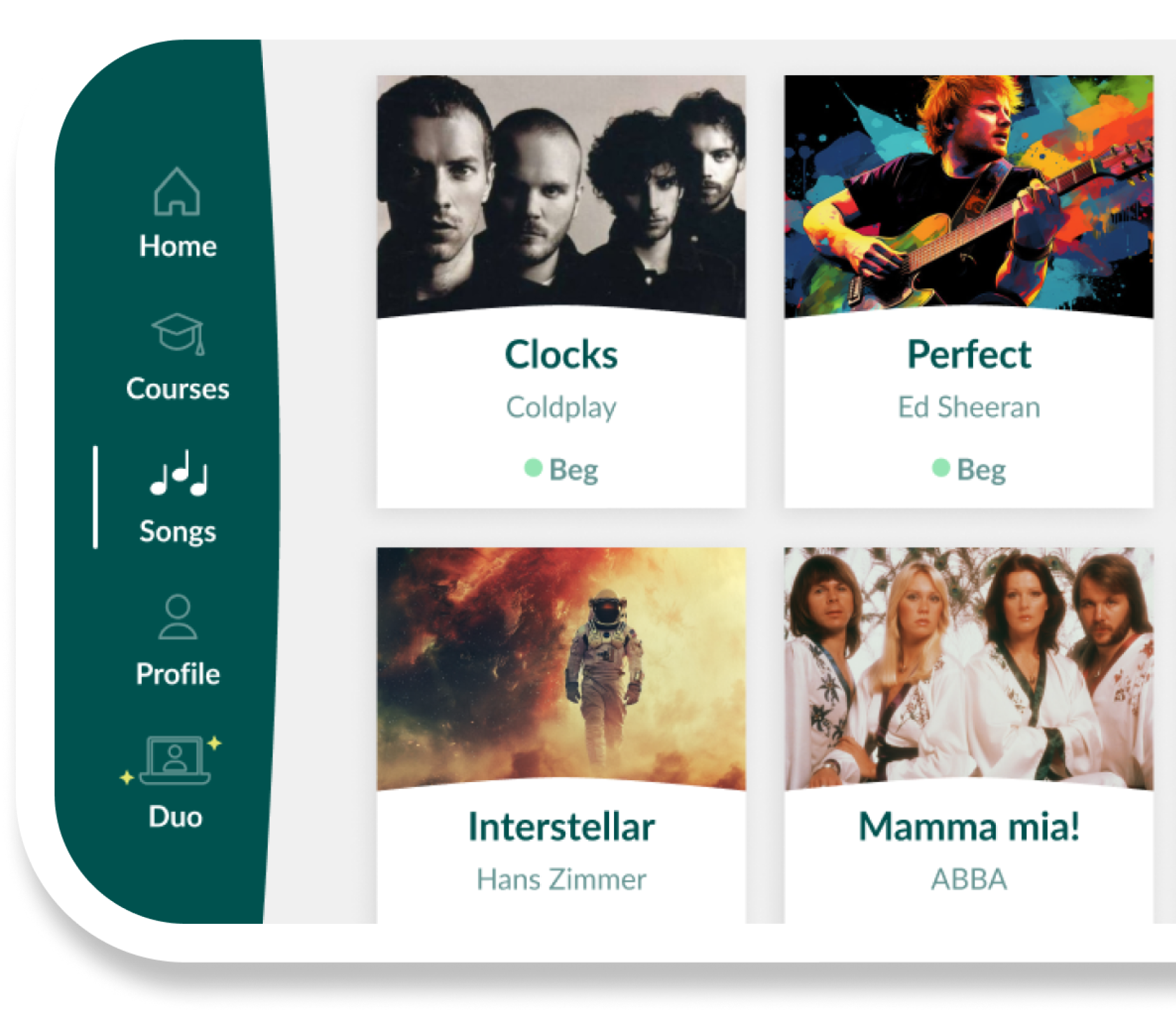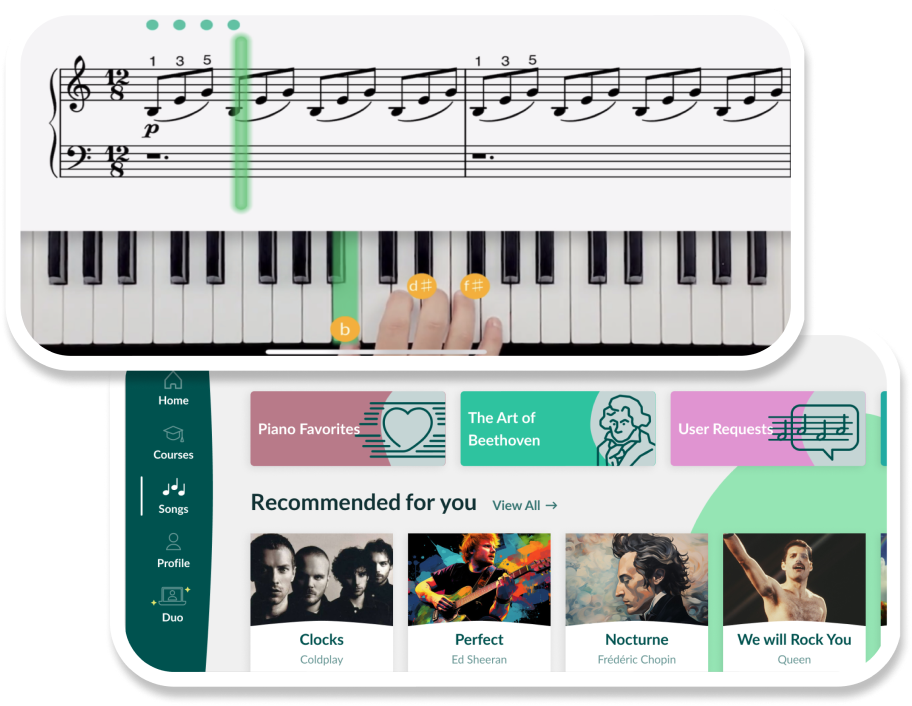The choice between learning piano and learning guitar is a common one. Both instruments are among the most popular in the world. Each instrument offers its own experiences, challenges, and benefits.
This article aims to provide a practical and realistic guide for individuals facing the piano vs. guitar decision.
Join us as we compare and contrast the piano and guitar, discussing everything from cost and maintenance to the nuances of learning each instrument. Our goal is to equip you with the knowledge you need to decide which path to take in your musical journey.
The ease of learning: piano vs guitar difficulty
Initial learning curve for beginners
Learning piano or the guitar presents unique challenges and rewards.
At the beginning, the piano is somewhat easier. The visual layout of the keyboard is simple to understand and makes learning music theory more intuitive. However, the difficulty often arises when you begin to play with both hands together and have to read to different clefs in different hands. This can be challenging!
On the other hand, learning the guitar is a different challenge. It can be more difficult for beginners to properly play notes and make a nice sound. However, once you get the hang of it, learning to play basic chord shapes is quite simple. However, the visual layout of the guitar is not as simple as the piano, which can make learning some music theory concepts a little more difficult.
Mastery and advanced techniques
As you advance with either instrument, the complexity of piano and guitar chords and the skills you must develop for each instrument diverge. More advanced piano techniques involve intricate finger patterns and a high level of precision in dynamics and pedaling technique. The layout of the keyboard requires a more thorough understanding of scales and chord progressions as you develop.
Advanced guitar playing, however, delves into complex chord shapes, faster fingerpicking or strumming patterns, and soloing techniques. The guitar’s fretboard offers a wide range of possibilities for creative expression, though mastering these techniques requires significant practice and muscle memory development.
Piano chords vs guitar chords
When comparing guitar chords vs piano chords, it’s worth noting that both instruments allow for a wide range of chord progressions and musical expressions. However, the inherent simplicity of the guitar’s chord structures and the physical feedback it provides can be more gratifying for some learners. Conversely, the piano offers a clear, logical progression of notes and chords, which can be more appealing to those who prefer a more structured approach to music theory.
Practical considerations: cost, maintenance, and space
Cost comparison
Financial considerations often play a significant role when deciding between piano and guitar. The entry costs for a piano can be higher than a guitar. Acoustic pianos, like grand or upright pianos, can be costly. Digital pianos can be a good alternative, however they often exceed the cost of most beginner guitars.
However, the long-term costs associated with both instruments should also be considered. Pianos require regular tuning and occasional repairs, which can add up over time. Guitars, while less expensive upfront, also need maintenance like string replacement and occasional setups.
Maintenance and care
Maintenance for pianos and guitars varies considerably. Pianos need periodic tuning to maintain their sound quality, especially after being moved or experiencing environmental changes. Acoustic pianos also require a stable environment to prevent damage from humidity and temperature fluctuations.
Guitar maintenance in general is much more simple. All you need to maintain a guitar is some regular cleaning and string changes. Sometimes, a guitar can be damaged by heat or other environmental factors.
Space requirements
The space requirements for each instrument is also important to consider. Grand and upright pianos are difficult to move and often require dedicated space. Digital pianos are easier for apartments or smaller living spaces, but still need their own space.
Guitars, in contrast, are highly portable and don’t require much space. They can be easily stored in a case when not in use, making them an ideal choice for those with space constraints.
Piano vs guitar: a detailed comparison
Keyboards and strings
The physical attributes of pianos and guitars define much of their appeal and playability. Pianos, with their expansive 88-key layout, offer a clear visual representation of musical scales, aiding learners in understanding the relationships between piano notes. However, this also means pianos require a dedicated, fixed space due to their size.
On the other hand, guitars are known for their portability. They allow musicians to practice and perform in various settings, but mastering the guitar’s fretboard demands a unique form of hand coordination. This difference in physicality plays a crucial role in a learner’s journey with each instrument.
Different music notation
Musical notation and reading is another area of difference between piano and guitar. Piano players are required to learn standard musical notation, including both treble and bass clefs. This skill is essential not just for playing a wide range of piano music but also for a deeper understanding of musical theory.
In contrast, guitar music often utilizes tablature (tabs), which many beginners find more accessible. Tabs provide a straightforward guide to finger positioning, making it easier to start playing songs early on. However, this simplicity can sometimes limit a comprehensive grasp of musical theory.
Tone and tuning
The differences in tuning and the range of tones and timbres is another important difference between piano and guitar. Pianos are tuned to deliver a consistent and rich tone across all piano keys, allowing for the creation of complex harmonies and a wide dynamic range. This makes the piano ideal for both solo and ensemble settings.
Guitars, on the other hand, offer a wide range of tonal expressions. The ability to easily adjust tuning enables guitarists to explore different musical styles and expressions. From gentle fingerpicking to powerful strumming, the guitar can adapt to various musical moods and genres.
Musical preferences and styles
Your own tastes and musical preferences are paramount when choosing between piano and guitar. Both instruments cater to a wide array of musical styles, but they each have their unique strengths in certain genres.
Piano: the classical and jazz favorite
- The piano is renowned for its prominence in classical and jazz music. Its ability to produce a wide range of dynamics and its suitability for complex harmonic compositions make it ideal for these genres.
- The expansive range of the piano also lends itself well to pop and contemporary music, offering a fullness and depth that can enhance these styles.
Guitar: the heart of rock and folk
- The guitar is synonymous with rock music, from acoustic ballads to electrifying guitar solos. Its portability and expressive nature make it a staple in rock, blues, and country music.
- Acoustic guitars, in particular, are a favorite in folk and indie genres, where their warm, natural tones can create an intimate musical experience.
Piano vs guitar in songwriting
Both instruments are incredibly strong and versatile when it comes to songwriting. The piano’s wide range enables composers to create rich, layered compositions, while the guitar’s versatility allows for a more direct and emotional connection with the listener. The choice between piano and guitar in songwriting often comes down to the desired sound and the songwriter’s personal comfort with each instrument.
Social and solo performance comparison
The piano and guitar in group dynamics
The piano serves as a harmonic anchor in ensemble settings, as well as s powerful and daring soloists in bands and orchestras.However, the physical limitations of a piano, mainly its size and immobility, can be a drawback in more spontaneous social scenarios.
Conversely, the guitar shines in group performances, especially in informal settings. Its portability allows it to be a focal point at gatherings, campsites, or impromptu jam sessions. The guitar’s capacity to provide both rhythm and harmony makes it an excellent companion for vocalists and other instruments, fostering a collaborative atmosphere.
Solo performances: piano vs guitar
In the realm of solo performances, each instrument brings its unique strengths. The piano is capable of delivering comprehensive and complex pieces on its own, offering a rich array of notes and the ability to weave multiple musical voices together. The visual element of piano playing, combined with the instrument’s inherent grandeur, often enhances the impact of solo piano performances.
The guitar, on the other hand, offers a more intimate and expressive solo experience. Its direct interaction with the strings allows guitarists to convey a wide spectrum of emotions, making it particularly effective for personal and emotive performances. Additionally, the guitar’s compatibility with vocal accompaniment makes it a favorite among singer-songwriters and solo artists.
Making your choice between piano and guitar
When deciding whether to learn piano or guitar, consider your personal preferences, the practical aspects of each instrument, and your musical aspirations. The piano might suit those seeking a deep understanding of music theory and diverse genres, while the guitar could appeal to those valuing versatility and physical engagement with the instrument.
The key to a fulfilling musical journey is finding joy in the learning process. Whether it’s the intricate melodies of the piano or the rhythmic strumming of the guitar, your enthusiasm and passion are crucial for progress and enjoyment.
Let your personal connection with the instrument guide you. Explore both options if possible, and choose the one that truly resonates with you. Remember, the path of learning an instrument is a rich and rewarding adventure, whether it leads you to the piano or the guitar.
Author of this blog post:
Susana Pérez Posada

With over seven years in piano education and a deep passion for music therapy, Susana brings a unique blend of expertise to Skoove. A graduate in Music Therapy from SRH Hochschule Heidelberg and an experienced classical pianist from Universidad EAFIT, she infuses her teaching with a holistic approach that transcends traditional piano lessons. In her writings for Skoove, Susana combines her rich musical knowledge with engaging storytelling, enriching the learning experience for pianists of all levels. Away from the piano, she loves exploring new places and immersing herself in a good book, believing these diverse experiences enhance her creative teaching style.
Edited and fact checked by Eddie Bond, multi-instrumentalist performer, composer, and music instructor
Published by Lidya Hovan from the Skoove team




